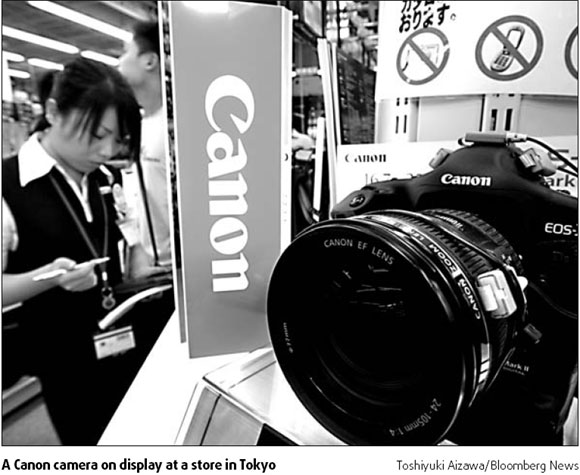Canon has first slide in 2 years

Canon Inc, Japan's most profitable office equipment maker, reported its first quarterly profit decline in two years because of a foreign-currency loss. The company cut its full-year sales forecast, citing a stronger yen.
Net income fell to 105.3 billion yen ($924 million), or 81.93 yen per share, in the three months ended September 30, from 115.6 billion yen, or 86.78 yen, a year earlier, Tokyo-based Canon said yesterday. Sales rose 6.4 percent to 1.05 trillion yen.
The 20.4 billion yen currency loss underscores Canon's vulnerability to foreign exchange swings because it gets 79 percent of sales from overseas.
The yen fell 5.9 percent against the euro in the first six months of the year before recovering half the losses. Europe is Canon's biggest market.
"Other makers of consumer electronics and components may also be affected" by a stronger yen, said Seiichiro Iwamoto, who helps oversee $26 billion at Mizuho Asset Management Co in Tokyo. Iwamoto declined to disclose his holdings.
Canon, the world's biggest digital camera maker, cut the annual sales estimate to 4.56 trillion yen from 4.58 trillion yen, citing a stronger yen.
The company kept its forecast for annual net income to rise 9.8 percent to 500 billion yen.
Operating profit will probably increase 9.3 percent to 773 billion yen this year, higher than a July forecast for 766 billion yen, on reduced costs to market its cameras and printers.
Canon in August said it plans to reduce expenses by about 100 billion yen annually.
The company said it assumed a rate of 115 yen to the dollar, 160 against the euro for the annual forecasts.
Possible loss
"A foreign-currency loss may be recorded again, depending on exchange-rate movements," Canon spokesman Bunji Yano said by phone from Tokyo.
The company has "some buffers" against currency movements, he said, without elaborating.
Third-quarter operating profit, or sales minus the cost of goods sold and administrative expenses, climbed 0.9 percent to 174.2 billion yen.
Canon shares fell 2.6 percent to 5,580 yen at the close on the Tokyo Stock Exchange, before earnings were reported.
The stock dropped 17 percent this year, compared with a 5.5 percent decline in the benchmark Nikkei 225 Stock Average.
Bloomberg News
(China Daily 10/26/2007 page16)














